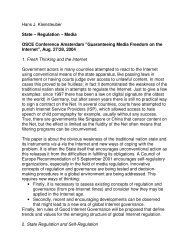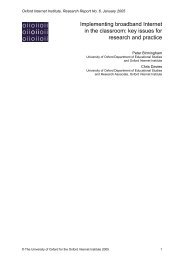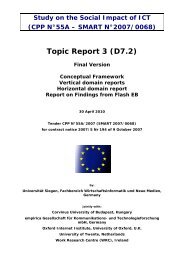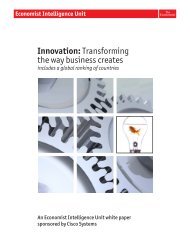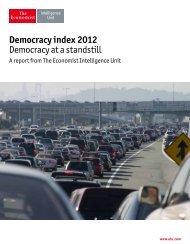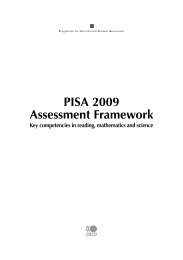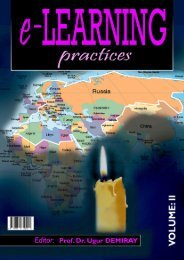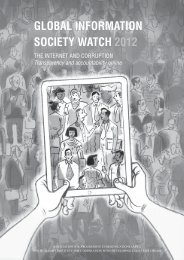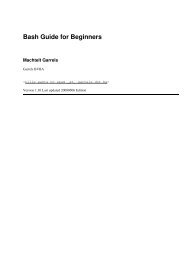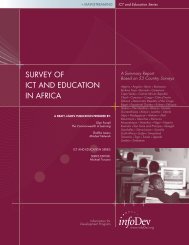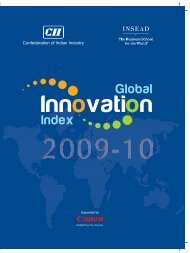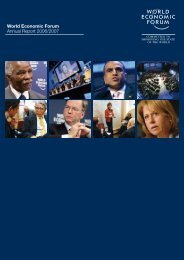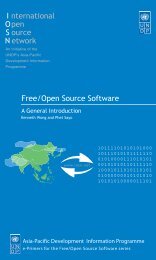Create successful ePaper yourself
Turn your PDF publications into a flip-book with our unique Google optimized e-Paper software.
6 ❘ FREE/OPEN SOURCE SOFTWARE: LOCALIZATIONThaiLocalization of FOSS in the Thai language was started in 1993 by Thai students in Japan in an effort to useThai in Unix environments. Later, a similar movement commenced in Thailand. These two movementsmerged and Linux TLE and the Thai Linux Working Group were launched in 1999. However, the movementwas limited to a small community until mid-2001 when the Thai version of OpenOffice.org, dubbedPladao and sponsored by Sun Microsystems (Thailand), was announced to the public. Documentation isbeing carried out by private publishers who, in exchange, will retain the copyright on their work for latersale to the public in the form of books and manuals.Only 10 individuals are actively involved in the project at this time, with development resources providedby a combination of private companies and government.Thai developers are using GNU Compiler and Tools for modifying GNU/Linux, Mozilla’s “Bugzilla” for defecttracking, and CVS for version and source control. In addition, OpenOffice.org, a productivity suite, isbeing localized for Thai users.The primary difficulties the Thais are experiencing include lack of feedback from users, lack ofdocumentation, and conflicts with other Thai localization projects because of a lack of coordination andstandards.The Thais intend to roll out the software for both the private sector and public institutions, but are still inthe planning stage at this time. The team has not yet seen a high-profile effort to promote the use ofFOSS in Thailand. This may change in the near future, depending on government and private funding. Incomparison to the CJK efforts, Thailand has fewer developers, less money, and less outside interest dueto the size of its market. Other Thai localization projects are discussed on pages 7-10.VietnameseFOSS localization to the Vietnamese language began in 1998, primarily as an individual effort by anenthusiast. Today, there are between 20-50 people working on the project. They are volunteers, providingtheir resources and time for <strong>free</strong>, and all are using FOSS tools for the work. But even with the number ofindividuals currently involved, there are not enough people to perform all of the necessary work.Vietnamese localizations of GNU/Linux, Gnome, KDE, XFCE, Fluxbox, OpenOffice.org, Mozilla, XMMS,GnuCash, Gaim and Knoppix are in progress.Plans for introducing the software to the Vietnamese people include the publication of books, formationof user groups in major cities, and provision of the software to private and public institutions. Already,there has been some effort to promote the use of FOSS in secondary schools, universities and governmentoffices. Recently the government adopted a FOSS policy.MalayThe Malaysian Institute of Microelectronic Systems (MIMOS) has launched a Web site to document projectsin FOSS within Asia with links to key resources. MIMOS’s goal is to localize key applications into thenational language, Bahasa Melayu. MIMOS has already developed a local language GNU/Linux GUI andopen source applications for the government. Two other localization projects are GNOME, led by HasbullahBin Pit, and OpenOffice.org, spearheaded by MIMOS.KhmerThe Khmer Software Initiative has an ambitious though under-funded plan to localize FOSS for Khmerspeakers in Cambodia and elsewhere. In addition to a localized version of the GNU/Linux user interfaceand some applications, they intend to create a development library, complete documentation both onlineand in print, and specialized training materials for developers and end users. It is not known how manyindividuals are working on the project currently.As elsewhere, the Khmer team envisions providing the software to both private and government users.A publicity campaign is planned and the developers expect significant support from the internationaldevelopment community to complete much of the work.



